TMK 2in1: workshop and barbecue
On the morning of 6 June Trade Marketing Club (TMK) organised a LinkedIn workshop, which was followed by a special club meeting and a barbecue in the afternoon, on the terrace of Budapest Anna Hotel.
This article is available for reading in Trade magazin 2024/8-9
Let’s create balance!
LinkedIn specialist Margó Kohanecz was the host of the morning session. The practice-oriented workshop guided the participants from LinkedIn basics such as profile development, networking opportunities and professional branding to the details of sales-oriented communication and solutions.
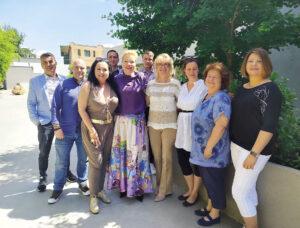
Cheerful participants of the training led by LinkedIn specialist Margo Kohanecz
TMK co-founder Ildikó Kátai hosted the afternoon club meeting, where the first presentation was by Dr Olívia Fekete, titled “Work-life balance done differently – focusing on our resources”. She pointed out that maintaining a work-life balance requires different strategies in different life situations and stages, and stressed the importance of awareness and mobilising personal resources. There are striking generational differences in how work-life balance is understood and managed. The middle and older generations have a very different outlook from the generations just entering the labour market, which can lead to conflicts within the group and at different levels of the hierarchy.
Models and practice
The psychologist also gave an insight into the various models for managing work-life balance. One model advocates the segmentation of the two areas: they should be separated and managed accordingly. Models such as resource-tapping and resource-exploitation argue that the two areas draw on our resources separately and that they can easily come into conflict, because our resources are finite.
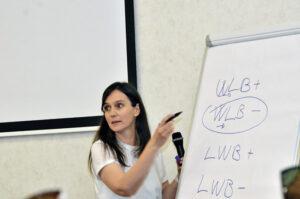
Dr. Olívia Fekete, psychologist, kicked off the afternoon club meeting with her presentation “Worklife balance in a different way – focus on our resources”
Other models argue that work and private life cannot be seen as completely separate, since there are regular transitions from work to private life and vice versa, which can have positive or negative effects. Dr Fekete pointed out that it is everyone’s individual responsibility to define what work-life balance means for them. We should be aware of the conditions under which we work and how acceptable they are to us. It is very important to recognise the price we pay and how long we are willing to continue.
Workplace relations and generational differences
In the second half of the afternoon Ágnes Csiby, company owner, psychologist and TMK co-founder moderated a round table discussion.
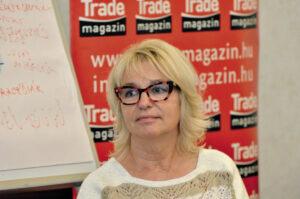
The closing round table was moderated by Ágnes Csiby, psychologist, CEO of PMS Solutions, co-founder of TMK
The participants were Dr Olívia Fekete, Mónika Vörös, Unilever lead for people experience in Eastern Europe, and Tibor Veress, head of Nestlé’s coffee category development team. The discussion focused on how to find solutions to typical problems in a multinational corporate environment by mobilising internal resources, while also being aware of individual goals and strengths.
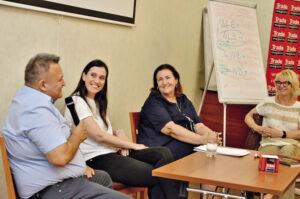
Participating in the exciting roundtable discussion were (from left to right) Tibor Veress, head of Nestlé’s coffee category development team, psychologist Dr. Olívia Fekete, Mónika Vörös, head of Unilever’s Eastern European people experience and psychologist Ágnes Csiby
Mónika Vörös told: it is useful to take measurements from time to time, because when we talk about how well an environment meets certain needs, the answer can be very different from different individuals, making it difficult to come up with a general conclusion. Every six month Unilever does surveys in every country and in every team, to find out how satisfied employees are.
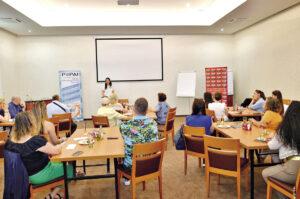
The June meeting of this year’s Trade Marketing Club was a truly unusual event, with the presentation followed by a workshop of the attendees and professional moderation
Tibor Veress informed that Nestlé conducts a work-life balance survey every year. Although the company repeatedly launches initiatives such as stress management training, it is often those who need it most who are unable to participate – simply because they don’t have the time. Work pressure is a big problem. Mr Veress thinks it would help if structures were clearer, and everyone knew exactly what their tasks were and how much time they needed to spend with them. Dr Olívia Fekete added that it is very important to develop managers psychologically. It is already common to train managers for mapping the character strengths of their employees, and to set individual development goals based on the results. At the end of the panel discussion the audience had the chance to ask questions from the panel members. The day ended with the discussions continuing on the terrace, enjoying delicious food and drinks. //
Related news
Nestle USA adds prebiotic beverages
🎧 Hallgasd a cikket: Lejátszás Szünet Folytatás Leállítás Nyelv: Auto…
Read more >Related news
Festival buzz at the 60th anniversary EuroShop trade fair
🎧 Hallgasd a cikket: Lejátszás Szünet Folytatás Leállítás Nyelv: Auto…
Read more >Historic price reduction at ALDI
🎧 Hallgasd a cikket: Lejátszás Szünet Folytatás Leállítás Nyelv: Auto…
Read more >








